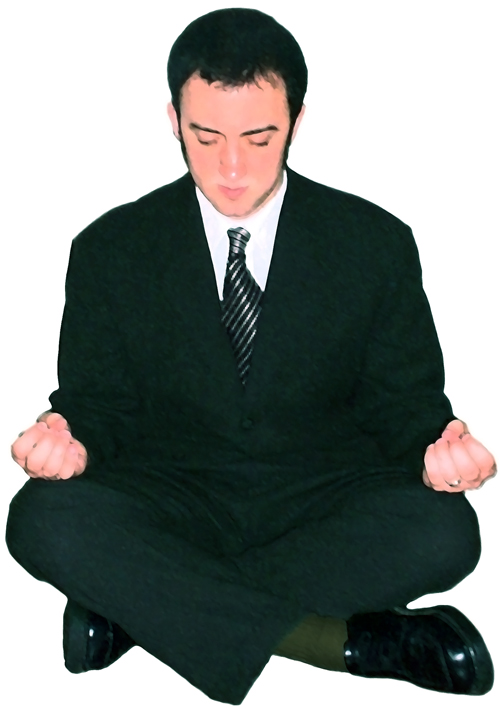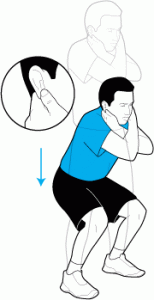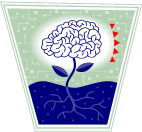Get Benefits of Long-Term Meditation in Just Days?
 It was about 10 years ago when research studies began to suggests that a little bit of physical activity could be good for you. Taking a short walk or even just climbing a flight of stairs might be heart-healthy. This was a big surprise for many as traditional wisdom was that you must work-out multiple times per week for many weeks to see benefits.
It was about 10 years ago when research studies began to suggests that a little bit of physical activity could be good for you. Taking a short walk or even just climbing a flight of stairs might be heart-healthy. This was a big surprise for many as traditional wisdom was that you must work-out multiple times per week for many weeks to see benefits.
Now the same may be emerging for brain training at least in the area of mindfulness and meditative practice. I am seeing studies that suggest a few days of training may produce what we once thought took months or years. The Science Daily Blog reports one such study, Brief Meditation Helps Cognition:
“Psychologists studying the effects of a meditation technique known as “mindfulness ” found that meditation-trained participants showed a significant improvement in their critical cognitive skills (and performed significantly higher in cognitive tests than a control group) after only four days of training for only 20 minutes each day.”
Specific improvements included increased mental energy, reduced anxiety and improved working memory, visual/spatial processing and executive functioning (attention, planning thinking).
Interestingly, no special training technique was used.
As described in the paper, “participants were instructed to relax, with their eyes closed, and to simply focus on the flow of their breath occurring at the tip of their nose. If a random thought arose, they were told to passively notice and acknowledge the thought and to simply let ‘it’ go, by bringing the attention back to the sensations of the breath.” Subsequent training built on this basic model, teaching physical awareness, focus, and mindfulness with regard to distraction.
Mindfulness training is not as natural as climbing a flight of stairs or taking a walk but clearly it is something we can learn. I am interested to hear from readers that practice mindfulness, especially how they were able to initially learn the technique.
Source: Image of Meditating Man
Categories: Ancient Ways, Executive Function, Mental Focus, Training Tags: meditation, mental energy, mindfulness
Integrative Body-Mind Training Improves Brain Functions in Just Five Days!
 There is growing evidence that a fast-track approach to mediation may in fact produce results in as little as five days. This would be a breakthrough as using mindfulness or mediative techniques to improve your cognitive functioning normally takes months or years.
There is growing evidence that a fast-track approach to mediation may in fact produce results in as little as five days. This would be a breakthrough as using mindfulness or mediative techniques to improve your cognitive functioning normally takes months or years.
The technique is called integrative body-mind training (IBMT) and requires 20 minutes per day for five days. Subjects with no previous training in mediation techniques showed significant improvements in mental focus, mood and stress.
The process involves using a number of techniques together under the guidance of a coach. The seminal article on IBMT, Short-Term Medication Training Improves Attention and Self-Regulation, describes it this way:
“Training in this method is followed by 5 days of group practice, during which a coach answers questions and observes facial and body cues to identify those people who are struggling with the method. The trainees concentrate on achieving a balanced state of mind while being guided by the coach and the compact disc that teaches them to relax, adjust their breathing, and use mental imagery.”
A more detailed description of how this works over a five day period can be found in this Introduction to IBMT written by Dr. Yi-Yuan Tang a pioneer in the field.
I am interested to hear from readers that can recommend a coach, suggest resources or share experiences about IBMT. I’d like to try it and write additional posts for the next Brain Blog.
Source: Image of running man.
Categories: Ancient Ways, Executive Function, Memory and Learning, Mental Focus, Music and Audio, Training Tags: meditation, mindfulness
Want a High Performance Mind?
Combat soldiers, surgeons, ER professionals, Olympic athletes and others that face extreme-stress situations involving judgement must all develop high performance minds to be successful. Cognitive performance in extreme circumstances has been studied closely and training programs and techniques have been developed and tested. How to use these techniques to build a high performance mind will be a frequent topic on the Next Brain Blog.
 For example, The Mind Fitness Training Institute, is in the news for a program they have for training the minds of US combat soldiers. They just completed a pilot study that demonstrated how mindfulness training techniques can improve working memory and affective response (or emotional control).
For example, The Mind Fitness Training Institute, is in the news for a program they have for training the minds of US combat soldiers. They just completed a pilot study that demonstrated how mindfulness training techniques can improve working memory and affective response (or emotional control).
Soldiers in the program start by mastering attentional control and concentration using a mindfulness training technique. A briefing document explains:
“At first, exercises emphasize building concentration by focusing on one object of attention, such as the breath, contact between the body and the floor or chair, or sensations within specific body parts. This single focus of attention is maintained throughout a practice session; when attention wanders, it is returned to the object of attention. Later in the course, exercises require attending to body sensations during movement and “shuttling” the attention between inner sensations andouter experiences (i.e., sights or sounds).”
This technique is used in many other programs that promise to build a high performance mind. An important finding because it tells us:
The first step in developing a high performance mind is to practice attentional control and concentration using a very simple training technique.
And you don’t need to have an extreme-stress job or attend a special training program to get started. Here is what you do:
- Rest comfortably by laying down or sitting
- Close your eyes if you want to
- Focus on your stomach and feel your breathing
- Pay attention to all your bodily sensations in your belly as move through the complete breathing cycle of inhaling and exhaling
- If you mind wanders to another topic or sensation return your attention to your belly and the cycle of breath.
Your only task here is to bring your mind back to the sensation of breathing every time it wonders. Sounds simple but it takes practice. And what you are learning is invaluable – how to control your own mind!
15 minutes per day for a week should produce a noticeable result. At the very least you will have first hand experience in attempting to control you attention in a systematic way. If you try it and please share your experience by leaving a comment.
Categories: Ancient Ways, Manage Emotions, Mental Focus, Training Tags: meditation, mindfulness
Can 3 Minutes of Yoga Daily Improve Your Brain?
 Doing Yoga can change how your brain functions. Yoga as a worldview, exercise routine and even a lifestyle offers important options for improving the performance of our minds and brains. The mind-enhancing effects of Yoga will be a regular topic on the Next Brain Blog.
Doing Yoga can change how your brain functions. Yoga as a worldview, exercise routine and even a lifestyle offers important options for improving the performance of our minds and brains. The mind-enhancing effects of Yoga will be a regular topic on the Next Brain Blog.
A simple Yoga exercise has been in the news lately. It involves holding your earlobes, placing your tongue on the roof of your mouth and rhythmically breathing while doing deep knee bends. Sounds a bit strange but it does not take long. According to many reports from teachers, doctors, therapists and scientists it produces results such as improved self-control, more mental energy and increased intelligence.
Check out this CBS news report for an introduction to the technique and what people are experiencing.
The news report mentions confirming EEG studies but I have not been able to locate those. I did find this post that offers this explanation:
“There is a lot of research to support that simple exercises like a breathing squat can improve function, focus and efficiency in the brain. Activation of specific acupressure points from the earlobes during the squat exercise stimulates the brain on the opposite side. Do the breathing squat exercise 21 times with the tongue touching the roof of the mouth. Exhale while squatting and inhale while standing up. Perform this movement with a 555 tempo. 5 seconds down-hold for 5 -5 seconds up. This simple exercise will activate chemicals in the brain, create synchronicity of the hemispheres, activate the pineal gland for awakeness and activate the pressure points of the ear lobes. The combination of crossing the midline, as well as stimulating the pressure points creates a perfect storm of electrical brain activity that stimulates neuropathways and can literally make you think better.”
If you want to give it a try be sure you are fit enough to do deep knee beds. You can find very clear directions on exactly what to do on eHow. If you do try it out please post a comment and share your results and experience.
Source: Exercise Image
Categories: Ancient Ways, IQ and EQ, Mental Focus, Training Tags: Yoga
Practice Mindfulness to Sharpen Mind and Perhaps Build a Bigger Brain
 Studies have shown that if you spend a lot of time juggling or playing a musical instrument the parts of your brain that supports these activities grows bigger. London taxi cab drivers that spend a decade memorizing elaborate routes experience significant brain changes. These facts support a major premise behind this blog namely, we are far more in charge of the shape, size, longevity and performance of our brain than we realize.
Studies have shown that if you spend a lot of time juggling or playing a musical instrument the parts of your brain that supports these activities grows bigger. London taxi cab drivers that spend a decade memorizing elaborate routes experience significant brain changes. These facts support a major premise behind this blog namely, we are far more in charge of the shape, size, longevity and performance of our brain than we realize.
It would stand to reason that people who meditated extensively should have bigger brains. I have found a few studies that that support this idea but there is not enough data for a firm conclusion. In one study:
“Our data suggest that meditation practice can promote cortical plasticity in adults in areas important for cognitive and emotional processing and well-being,” says Sara Lazar, leader of the study and a psychologist at Harvard Medical School. “
In a second study:
“Using MRI scans the scientists show that there was “significantly larger cerebral measurements in mediators”.
No matter, even if mediation does not grow your brain there have been studies that demonstrate improved clarity of thinking, enhance self-control, reduced stress and self-reported well being. As such it is an important option for improving cognitive performance and will be a frequent topic on the Next Brain Blog.
 Buddhist insight mediation that advocates focusing on sensation rather than our thoughts of sensation seems to produce results. It is similar to the more modern movement of mindful mediation that focuses on “being in the moment”. Finally, there is a third, non-mediative approach to mindfulness that we will explore. It is based on the contemporary work of Ellen Langer and seeks to achieve a heightened state of situational awareness of conscious control over thoughts and actions. Insight mediation, mindful mediation and cognitive mindfulness.
Buddhist insight mediation that advocates focusing on sensation rather than our thoughts of sensation seems to produce results. It is similar to the more modern movement of mindful mediation that focuses on “being in the moment”. Finally, there is a third, non-mediative approach to mindfulness that we will explore. It is based on the contemporary work of Ellen Langer and seeks to achieve a heightened state of situational awareness of conscious control over thoughts and actions. Insight mediation, mindful mediation and cognitive mindfulness.
If you are interested in giving it a try I suggestion action over reading. Try this simple five-step experiment in mindful meditation.
Source: Mindfulness Image
Categories: Ancient Ways, IQ and EQ, Manage Emotions, Mental Focus, Training Tags: Buddhist, meditation, mindfulness
Critical Reasoning Sharpens the Mind But Takes Mega Effort to Develop
 Thinking or reasoning critically is a key cognitive skill. It means we know how to question assumptions, see the logic or lack of logic in an argument, draw sound conclusions from evidence, find root concepts and causes, generate possibilities systematically, avoid decision traps and cognitive biases, see things from multiple points of view and otherwise rigorously deal with ambiguity.
Thinking or reasoning critically is a key cognitive skill. It means we know how to question assumptions, see the logic or lack of logic in an argument, draw sound conclusions from evidence, find root concepts and causes, generate possibilities systematically, avoid decision traps and cognitive biases, see things from multiple points of view and otherwise rigorously deal with ambiguity.
Critical thinking is so important that it has been a major area of focus since the time of the ancient Greek philosophers. But it is not just a philosophical thing. For example, in a recent post on the Harvard Business Review’s blog How Leaders Should Think Critically, the authors argue that it is a fundamental skill for today’s business leaders and students. Of course the same arguments apply to non-business school students and leaders as well as everyone trying to make their way in today’s complex society.
In short, enhancing critical thinking is an important option for anyone interested in building a sharper mind and will be a regular topic on this blog.
But how can you improve it? Self-study using a book or web resource is a good way. I’ll make a couple of recommendations below. You can also scout out a class or seminar at a location near you. For those who like a more guided approach, you can contract the services of a tutor or philosophical counselor.
No matter how you start please be sure to share your experiences with other readers of this blog.
For a good introductory text on critical reasoning see, Thought and Knowledge: An Introduction to Critical Reasoning. It is relatively inexpensive, easy to read and covers basic and advanced topics. It has a more psychological than philosophical orientation and provides nice chapter summaries. You can access it online on Questia here.
For a very comprehensive free treatment, check out Critical Reasoning a User’s Manual (version 3.0). It is a 640-page (3 MB) PDF. It is also available online in the document reader Scribd here.
Both these resources will take an enormous effort to get through! If you are aware of a better general introduction please comment on this post. In the meantime, I will blog on specific techniques that you can use to build critical reasoning skills with much less effort.
Categories: Ancient Ways, Books, Decision Making, Problem Solving, Training Tags: critical reasoning, critical thinking
